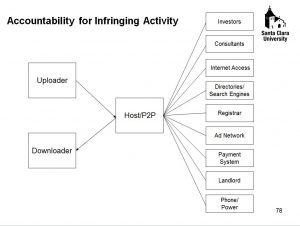Internet Access Provider Gets Another Devastating Result in a Secondary Copyright Infringement Case—Sony v. Cox
 In a recent post, I lamented how courts are exposing IAPs to secondary copyright liability for their subscribers’ activities. This is the result of a breakdown in the détente associated with the failed Copyright Alert System, and its demise has almost made me wistful for that terrible “voluntary” solution because courts keep suggesting even worse standards.
In a recent post, I lamented how courts are exposing IAPs to secondary copyright liability for their subscribers’ activities. This is the result of a breakdown in the détente associated with the failed Copyright Alert System, and its demise has almost made me wistful for that terrible “voluntary” solution because courts keep suggesting even worse standards.
This case is no exception, as the court says that the IAP gets all the notice it needs when a copyright owner’s representative sends a notice about individual subscribers. As the court implies, with those notices, the IAP could have terminated the subscriber. While that’s true, the disconnection of Internet access may be a remedy mismatched to the alleged violation.
I’m not sure why IAP liability doctrines are going so far wrong. In particular, I’m not sure why, 20 years later, we’re seeing the complete collapse of 17 USC 512(a). Whatever the reason, the result should be chilling to all of us. This court implies that unverified complaints from copyright owners should compel IAPs to terminate subscribers–at the peril of facing bankruptcy-inducing damages awards.
This case follows the BMG v. Cox lawsuit. In this case, “Plaintiffs claim that Defendants are liable for infringement of 7,068 copyrighted sound recordings and 3,452 copyrighted musical compositions from February 1, 2013 until November 26, 2014….Plaintiffs identified individual Cox accounts that received three or more infringement notices, and have established those subscribers as the basis for Defendants’ liability here. This parameter helped determine the 10,478 works in suit, and the four P2P networks involved: BitTorrent, Gnutella, eDonkey, and Ares.”
The court says that Cox has the requisite knowledge of infringing activity, enough to grant summary judgment on that point to the plaintiffs:
MarkMonitor gathered data and generated infringement notices to send to Cox on behalf of RIAA; the notices included the information required under the Digital Millennium Copyright Act (“DMCA”), 17 U.S.C. § 512(c). This included “variables such as the timestamp of the infringement detection, the date the notice as sent, the NoticelD, the Cox user (identified by IP address and Port), and a hash value pertaining to the file.”…
Based on the level of detail included in the notices directed at Cox and its subscribers, there is no doubt that Defendants had more than just “generalized knowledge” of infringement. A far cry from the comprehensive list of copyrighted works at issue in Ludvarts with no indication of specific activity, the notices in this case are specific to the time, subscriber, work, and all additional data as dictated by § 512(c)(3) of the DMCA. Further, because Cox maintained the ability to suspend or terminate these infringing accounts, this was “specific enough knowledge of infringement that the defendant could do something about it.”…
The Parties produced thorough evidence of Cox’s role as the middle man between Plaintiffs and the internet subscribers, processing the RIAA notices and forwarding certain information to its customers. It would be farcical to argue that Cox had no knowledge of the hundreds of thousands of notices it received indicating infringement for the works in suit….
After receiving a notice from RIAA, Cox could have acted in several capacities—for instance, it could have further evaluated the subscriber’s overall activity or terminated that subscriber. If Cox had done something about the specific instances of infringement at issue, it could have addressed the infringement of a both sound recording and a musical composition for over 3,000 of the works in suit…. In this case, the notices accomplished far more than telling Cox that some number of subscribers were infringing. They told Cox which ones. The standard is focused on the subscriber, not the particular works infringed, and the specific instance of infringement guides service providers to the source.
The court distinguishes the Ninth Circuit’s Cobbler decision on the grounds that it was “relevant to individual account holders, not the provider of said account.” Plus, “enforcement against individual infringers is improbable.”
This ruling opened the door for a jury trial, which took place in mid-December. The results were devastating to Cox. The jury awarded the plaintiffs nearly $100,000 per infringed work, for a total jury award of $1 billion, The entire IAP industry is doomed if IAPs are liable for $100k per user-downloaded infringement. Of course this ruling will be appealed (an appeal was inevitable no matter what result), but Cox can’t be enthusiastic about another trip to the Fourth Circuit, which stung it pretty hard in the BMG case. I’m glad I’m not a Cox stockholder.
Case citation: Sony Music Entertainment v. Cox Communications, Inc., 2019 WL 6357963 (E.D. Va. Nov. 27, 2019). Jury verdict from Dec. 19.

Pingback: News of the Week; January 1, 2020 – Communications Law at Allard Hall()
Pingback: Top Internet Law Developments of 2019 - Technology & Marketing Law Blog()
Pingback: Top Internet Law Developments of 2019 - News Machine()